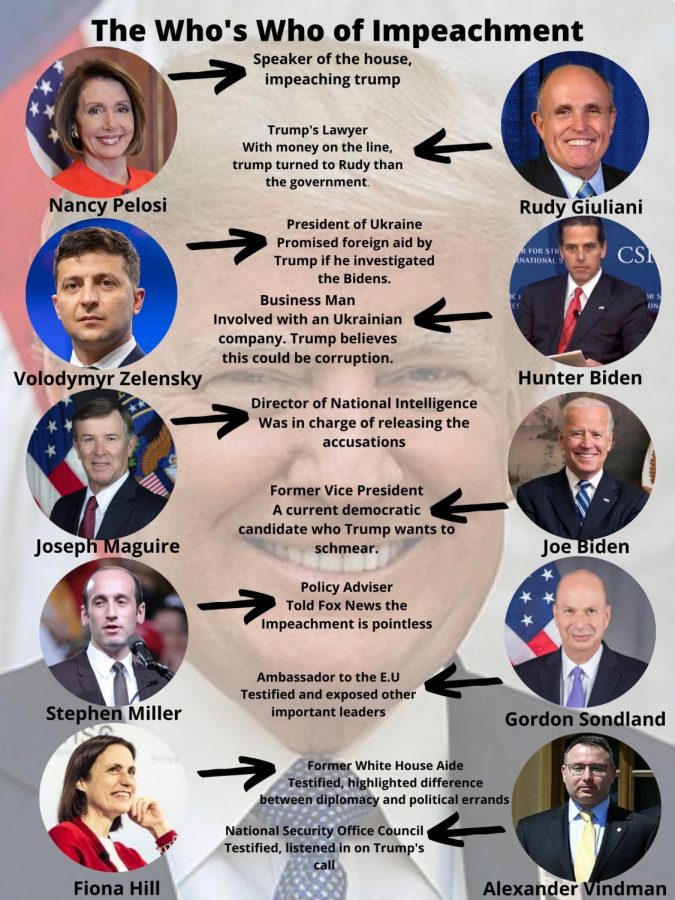Trump’s impeachment: what you need to quid pro know
All the key players and events that have taken place so far in the trial impeachment
As if Trump’s tweets weren’t difficult enough, it feels like the impeachment investigation only gets more confusing. Below is a play by play of the key players in what’s happening in Washington.
Whistle Blown:
Why are we even considering impeaching Trump? The formal investigation all stems from a complaint that came to the surface in September 2019 by a government “whistleblower”.
This whistleblower, who is supposedly a member of the CIA and the National Security Council, filed a report claiming that they overheard questionable negotiations during a phone call between President Trump and Ukrainian President Voldodymyr Zelensky in July.
The whistleblower wrote in the complaint that they had received, “information from multiple U.S. Government officials that the President of the United States is using the power of his office to solicit interference from a foreign country in the 2020 U.S. election.”
“This interference includes, among other things, pressuring a foreign country to investigate one of the President’s main domestic political rivals,” the whistleblower added.
Here’s where things get messy. In high profile cases like these, Washington uses the Whistleblower Protection Act, keeping this intelligence official anonymous for their safety.
While multiple officials have stepped forward to support the report’s claims, the Trump Administration has used this anonymity to try and discredit the source and point fingers at the Democratic Party.
The “Perfect” Call:
While the public really only learned of the expose report as of September, the initial complaint was actually filed by the Whistleblower in July. These accusations wouldn’t be released for almost two months because Director of National Intelligence Joseph Maguire never forwarded it.
Maguire wasn’t the first to try and sit on the information. The whistleblower stated that he understood the “gravity” of the situation when senior White House Officials allegedly tried to “lock down” all records of the call, specifically the word-for-word transcript.
Once the existence of the report was leaked, the White House, backed into a corner, decided to release the transcript. Trump’s conversation with Zelenksy can pretty much be boiled down to this; Trump would give Ukraine a significant amount of foreign aid if Zelensky would agree to investigate the Biden Family.
Trump’s main focus was to find dirt on Joe Biden’s son, Hunter Biden, who was involved with a Ukrainian Energy Company.
The President believed that Hunter Biden’s involvement with the overseas energy business pointed towards corruption that he could use against Joe Biden in the upcoming election.
Trump let Ukraine sleep on the decision, holding around $390 million worth of aid over their heads.
When Zelensky called back, Trump directed the dealings to his personal lawyer, Rudolph Giuliani, rather than to actual government officials. Upon the statements leak, Trump took to Twitter to defend himself claiming that the Zelensky call was “perfect” in terms of legal form, but the investigation was already underway.
No Quid pro quo?
“The whole Russia thing was a Hoax, and the Ukraine thing is a Hoax, and the Democrats are a Joke. This is a disaster for them! The Do Nothing Democrats are hurting our Country, and they don’t care!” stated Trump in a Nov. 24 tweet.
Trump, along with the majority of White House staff, insist that Trump is innocent and that the call wasn’t bribery but rather a financial incentive which is a routine part of government.
White House senior policy adviser, Stephen Miller, appeared on Fox News to say that the impeachment hearings are democrats creating a “little Nancy Drew novel” and that if anyone was the whistleblower it’s Trump for “exposing” the Bidens.
Over the past few weeks, however, numerous high ranking officials have stepped forward to condemn Trump with their hearing testimonies. Ambassador to the E.U., Gordon Sondland, as well as the National Security Aide to Mike Pence, Jennifer Williams, both overheard the July 25 phone call and were disturbed by the Ukraine exchange.
National security office council, Lt. Col. Alexander S. Vindman said that he tried to recover pieces of blacked out transcript but was unable. Vindman also stated that the financial freeze on Ukraine was not supported by most officials.
What now?
The House Intelligence Committee met on Dec. 4 before the House Judiciary Committee alongside four constitutional legal experts to help decide if they should start writing up articles of impeachment against Trump.
The White House Counsel denied Wednesday’s invitation on behalf of Trump, calling the investigation, “baseless and highly partisan” and that Trump won’t consider attending future impeachment events if he feels he won’t be represented “meaningfully.”
Democrats hope for a final decision from the House by Christmas, but the real power lies in the hands of the Senate. While the majority of the House are Democrats, it will take a two-thirds vote from the Senate with 53 republicans.









































